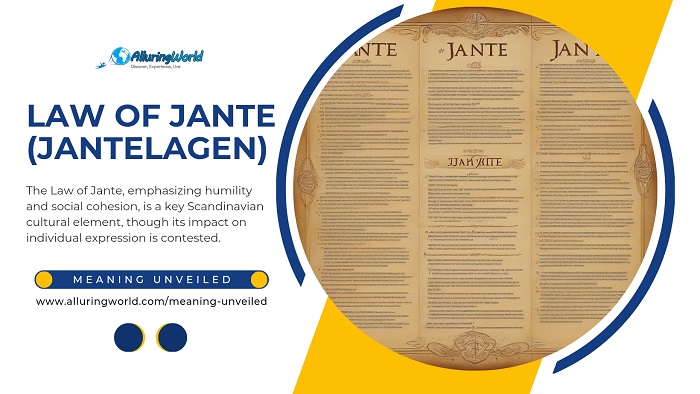Read time ca. 3 minutes
Law of Jante or Jantelagen is a form of societal ethics that fosters humility, egalitarianism, and overall prosperity over one’s success. Even though it is not being in effect as law but an unenforced maxim of social decency, it determines to a certain degree cultural predisposition, mainly found in the cultures of the Scandinavian countries. Law of Jante was founded on Danish-Norwegian author Aksel Sandemose’s novel from 1933, A Fugitive Crosses His Tracks, because this is a novel that explains the behavioristic attitude, suppressing egocentrism and boasts and ensures collective good together with modesty.
Origins and Meaning:
Sandemose introduced the Law of Jante through the fictional town of Jante, where societal norms strictly govern individual behavior. The law consists of ten rules, all revolving around the idea that no one should think they are better, smarter, or more important than others, and some of the key statements include:
- You shall not think you are special.
- You shall not think you are wiser than us.
- You shall not think you are better than us.
Although originally intended as a critique of small-town mentality, the Law of Jante resonated deeply with Scandinavian values of egalitarianism and social cohesion, becoming a widely recognized cultural concept, and in addition to the above three mentioned laws, here are the rest of them:
- You shall not think you are as good as we are.
- You shall not think you know more than us.
- You shall not think you are more important than us.
- You shall not think you are good at anything.
- You shall not laugh at us.
- You shall not think anyone cares about you.
- You shall not think you can teach us anything.
Impact on Scandinavian Society:
Jantelagen has influenced various aspects of life in Sweden, Denmark, and Norway since it fosters a culture where success is often downplayed, and humility is valued over personal ambition. This mindset can be seen in:
- Workplaces: Employees tend to avoid excessive self-promotion, and teamwork is prioritized over individual achievements.
- Social Interactions: Modesty and humility are considered virtues, and overt displays of wealth or success may be frowned upon.
- Government and Welfare Systems: Scandinavian countries emphasize social equality, progressive taxation, and collective well-being, aligning with Jante’s principles.
However, critics argue that Jantelagen, while intended to promote social harmony, can sometimes suppress ambition and discourage innovation, as individuals may feel pressured to conform rather than stand out, ultimately hindering societal progress and limiting the potential for new ideas and advancements.
Modern Interpretations and Criticism:
In recent years, things have evolved regarding the Law of Jante. While humility and equality are still values that most Scandinavians hold dear today, there is also greater value placed on individual success and being different, so globalization, commerce, and social media have all interfered with the old Jante rules, and success is now more freely celebrated than it is avoided.
Others have argued that while Jantelagen serves to maintain a sense of justice and collectivism, it cannot do so at the cost of individual aspiration and self-improvement. Others state that it serves as a reminder to remain humble and polite in a world where success is likely to be overemphasized.
Conclusion:
Overall, the Law of Jante continues to be an influential cultural notion within Scandinavia, indicating values ingrained deeply in the region of humility, equity, and cohesion in society. Despite influencing the success mentality as well as a sense of community, its utility remains contested within today’s world, and as a motivating factor toward justice or an imposition of limitations upon personal expression, Jantelagen remains an identity-marking element within Scandinavian culture.

